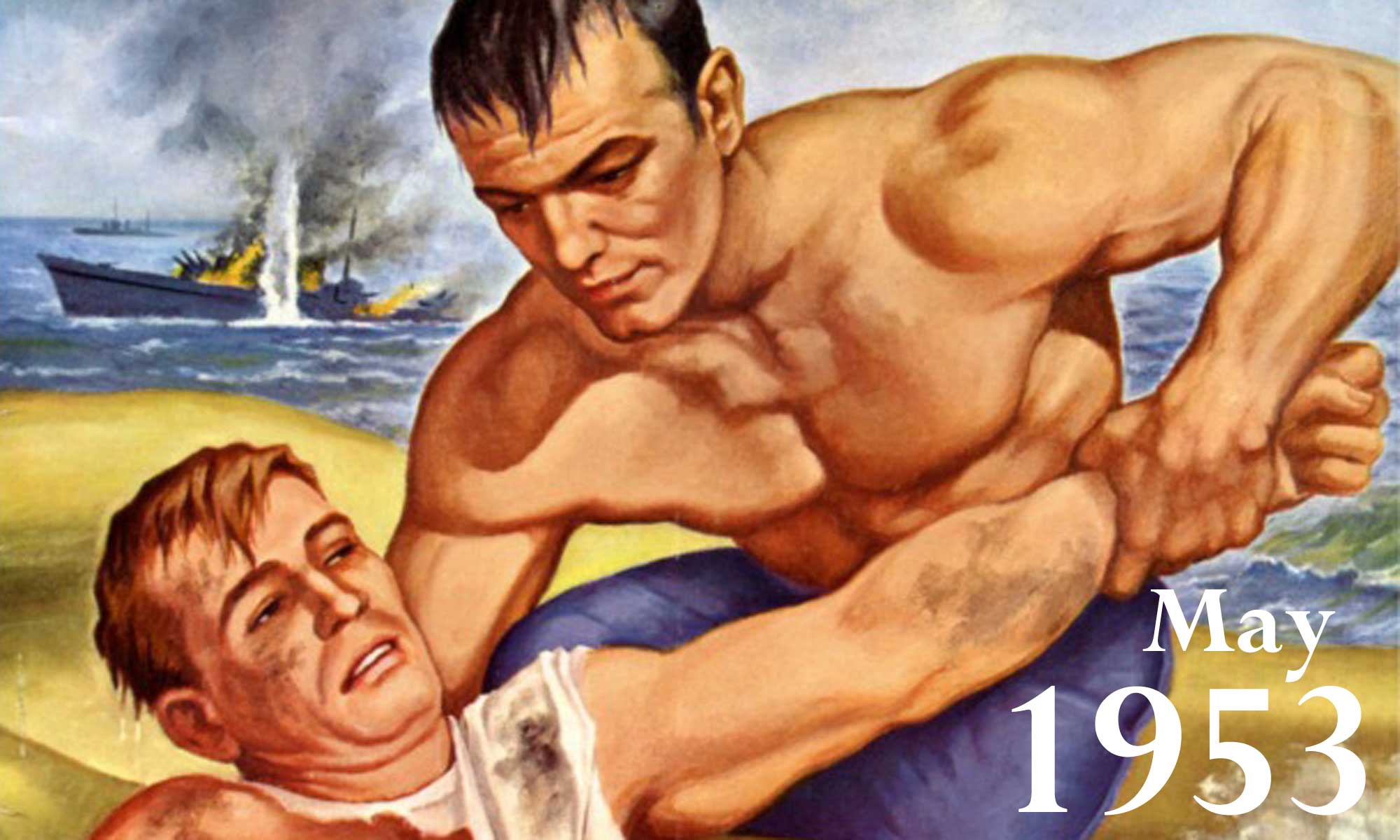| ◄ MAY ► | ||||||
|---|---|---|---|---|---|---|
| ◄ 1953 ► | ||||||
| 1 | 2 | |||||
| 3 | 4 | 5 | 6 | 7 | 8 | 9 |
| 10 | 11 | 12 | 13 | 14 | 15 | 16 |
| 17 | 18 | 19 | 20 | 21 | 22 | 23 |
| 24 | 25 | 26 | 27 | 28 | 29 | 30 |
| 31 | ||||||
| President: | Dwight D. Eisenhower (R) | |||
| Vice-President: | Richard M. Nixon (R) | |||
| House: | 210 (D) | 221 (R) | 1 (Other) | 3 (Vacant) |
| Southern states: | 99 (D) | 6 (R) | 1 (Vacant) | |
| Senate: | 47 (D) | 48 (R) | 1 (Other) | |
| Southern states: | 22 (D) | |||
| GDP growth: | 5.4% | (Annual) | ||
| -0.6% | (Quarterly) | |||
| Inflation: | 1.1% | |||
| Unemployment: | 2.5% | |||
| US killed in action, | 274 | (This month) | ||
| Korean conflict: | 34,844 | (Since Jun 28, 1950) | ||
![]() May 1: The United Nations accuses the Chinese and North Koreans of illegally holding back at least 375 sick and disabled allied prisoners of war during the prisoner exchange that ended the previous week. Sources say that at least 160 of the sick and wounded may be Americans. Rear Admiral John C. Daniel, the lead U.N. negotiator, tells the Communists, “If you fail to carry out in good faith the April 11 agreement… the U.N. command can have no choice but to question your sincerity with respect to reaching and carrying out agreements on broader questions confronting the armistice delegations.” The Communists flatly reject the accusation as “a willful slander not worth refuting.”
May 1: The United Nations accuses the Chinese and North Koreans of illegally holding back at least 375 sick and disabled allied prisoners of war during the prisoner exchange that ended the previous week. Sources say that at least 160 of the sick and wounded may be Americans. Rear Admiral John C. Daniel, the lead U.N. negotiator, tells the Communists, “If you fail to carry out in good faith the April 11 agreement… the U.N. command can have no choice but to question your sincerity with respect to reaching and carrying out agreements on broader questions confronting the armistice delegations.” The Communists flatly reject the accusation as “a willful slander not worth refuting.”
![]() May 1: Richard Combs, counsel for the California Senate Un-American Activities Committee, charges that Communists have infiltrated the San Francisco public schools and San Francisco Junior College. He says he will recommend at the committee’s June meeting that the committee offer its facilities to school districts so they can determine the extent of Communist infiltration. Dr. Herbert C. Clish, San Francisco school superintendent demands “the names of any of the staff whom you know to be actual Communists and evidence to that effect which will stand up in court.” Meanwhile, State Sen. Jack McCarthy (R-Marin) announces that the committee will hold a public hearing in San Rafael to investigate alleged subversive books in Marin County’s schools.
May 1: Richard Combs, counsel for the California Senate Un-American Activities Committee, charges that Communists have infiltrated the San Francisco public schools and San Francisco Junior College. He says he will recommend at the committee’s June meeting that the committee offer its facilities to school districts so they can determine the extent of Communist infiltration. Dr. Herbert C. Clish, San Francisco school superintendent demands “the names of any of the staff whom you know to be actual Communists and evidence to that effect which will stand up in court.” Meanwhile, State Sen. Jack McCarthy (R-Marin) announces that the committee will hold a public hearing in San Rafael to investigate alleged subversive books in Marin County’s schools.
![]() May 1: The Vietminh Communist insurgents have begun firing at French positions on the Laotian royal capital city of Luang Prabang. The Vietminh advance comes after they captured the last French outpost guarding the approaches to the city from the north.
May 1: The Vietminh Communist insurgents have begun firing at French positions on the Laotian royal capital city of Luang Prabang. The Vietminh advance comes after they captured the last French outpost guarding the approaches to the city from the north.
![]() May 2: Secretary of State John Foster Dulles announces that the U.S. is rushing “critically needed military items” to French Union forces defending Laos against a Vietminh invasion from Vietnam. The announcement comes as Vietminh troops are seen massing on the northern, eastern, and southern borders of Thailand.
May 2: Secretary of State John Foster Dulles announces that the U.S. is rushing “critically needed military items” to French Union forces defending Laos against a Vietminh invasion from Vietnam. The announcement comes as Vietminh troops are seen massing on the northern, eastern, and southern borders of Thailand.
![]()
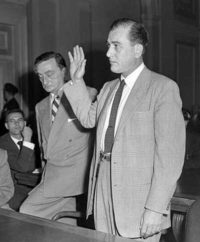 May 4: Bandleader Artie Shaw is called to testify before the House Un-American Activities Committee, which is launching a new round of Communist investigations under its chairman, Rep Harold Velde (R-IL). Shaw admits that in 1946 he attended a few meetings at a home in Laurel Canyon in Los Angeles, but denies having been a member of the Communist party. In sometimes weepy testimony, he calls himself a “dupe” and a “sucker for signing things.” The Associated Press dutifully notes that the “oft-married Shaw, 43, has been dubbed an ‘intellectual’ among musicians.”
May 4: Bandleader Artie Shaw is called to testify before the House Un-American Activities Committee, which is launching a new round of Communist investigations under its chairman, Rep Harold Velde (R-IL). Shaw admits that in 1946 he attended a few meetings at a home in Laurel Canyon in Los Angeles, but denies having been a member of the Communist party. In sometimes weepy testimony, he calls himself a “dupe” and a “sucker for signing things.” The Associated Press dutifully notes that the “oft-married Shaw, 43, has been dubbed an ‘intellectual’ among musicians.”
![]() May 4: Vietminh forces under Gen. Ho Nguyen Giap hold off their expected assault against the Laotian royal capital of Luang Prabang, and swing southward toward the administrative capital of Vientiane. It is feared that the Vietminh may seek to gain a significant propaganda coup by capturing both capital cities. Such a move would also split Laos in two and leave Northeast Thailand defenseless. Vientiane lies on the Mekong River, which serves as the border between Laos and Thailand.
May 4: Vietminh forces under Gen. Ho Nguyen Giap hold off their expected assault against the Laotian royal capital of Luang Prabang, and swing southward toward the administrative capital of Vientiane. It is feared that the Vietminh may seek to gain a significant propaganda coup by capturing both capital cities. Such a move would also split Laos in two and leave Northeast Thailand defenseless. Vientiane lies on the Mekong River, which serves as the border between Laos and Thailand.
![]()
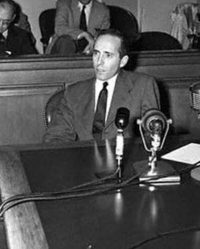 May 5: American choreographer, theater producer and director Jerome Robbins appears before the House Un-American Activities Committee. For the past three years he has admitted to have been a Communist Party member from 1944 to 1947, but he has refused to name names. Now he names eight other former Communists, including actors Lloyd Gough, Elliot Sullivan, and Madeline Lee; dance critic Edna Ocko, filmmaker Lionel Berman and playwrights Jerome Chodorov and his brother Edward Chodorov. Two of Robbins’s relatives will later reveal that Robbins testified because he had been threatened with exposure of his homosexuality.
May 5: American choreographer, theater producer and director Jerome Robbins appears before the House Un-American Activities Committee. For the past three years he has admitted to have been a Communist Party member from 1944 to 1947, but he has refused to name names. Now he names eight other former Communists, including actors Lloyd Gough, Elliot Sullivan, and Madeline Lee; dance critic Edna Ocko, filmmaker Lionel Berman and playwrights Jerome Chodorov and his brother Edward Chodorov. Two of Robbins’s relatives will later reveal that Robbins testified because he had been threatened with exposure of his homosexuality.
![]()
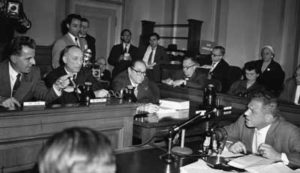 May 6: Actor Lionel Stander tells the House Un-American Activities Committee that he is not now a Communist, but refuses to repeat under oath his former frequent denials that he ever was one. Stander, who had been under an intermittent Hollywood blacklist over the past decade, angrily tells the committee that testifying “is like the Spanish Inquisition. You may not be burned, but you can’t help coming away a little singed.” He also says, “I know of a group of fanatics who are desperately trying to undermine the Constitution of the United States by depriving artists and others of life, liberty, and the pursuit of happiness without due process of law … I can tell names and cite instances and I am one of the first victims of it. And if you are interested in that and also a group of ex-fascists and America-Firsters and anti-Semites, people who hate everybody including Negroes, minority groups and most likely themselves … and these people are engaged in a conspiracy outside all the legal processes to undermine the very fundamental American concepts upon which our entire system of democracy exists.” His testimony makes front-page headlines, and will be featured in Eric Bentley’s 1972 play, Are You Now Or Have You Ever Been. It will also get him blacklisted for the next two decades.
May 6: Actor Lionel Stander tells the House Un-American Activities Committee that he is not now a Communist, but refuses to repeat under oath his former frequent denials that he ever was one. Stander, who had been under an intermittent Hollywood blacklist over the past decade, angrily tells the committee that testifying “is like the Spanish Inquisition. You may not be burned, but you can’t help coming away a little singed.” He also says, “I know of a group of fanatics who are desperately trying to undermine the Constitution of the United States by depriving artists and others of life, liberty, and the pursuit of happiness without due process of law … I can tell names and cite instances and I am one of the first victims of it. And if you are interested in that and also a group of ex-fascists and America-Firsters and anti-Semites, people who hate everybody including Negroes, minority groups and most likely themselves … and these people are engaged in a conspiracy outside all the legal processes to undermine the very fundamental American concepts upon which our entire system of democracy exists.” His testimony makes front-page headlines, and will be featured in Eric Bentley’s 1972 play, Are You Now Or Have You Ever Been. It will also get him blacklisted for the next two decades.
![]()
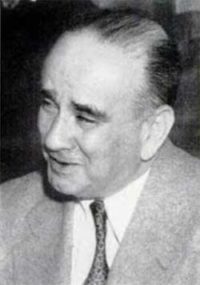 May 6: Russian-born songwriter Jay Gorney (“Brother, Can You Spare A Dime?”) also appears before the House Un-American Activities Committee. He describes a tune he had written about the First Amendment to help his father learn about the U.S. Constitution. Gorney sings it twice before refusing to say whether he had ever been a Communist.
May 6: Russian-born songwriter Jay Gorney (“Brother, Can You Spare A Dime?”) also appears before the House Un-American Activities Committee. He describes a tune he had written about the First Amendment to help his father learn about the U.S. Constitution. Gorney sings it twice before refusing to say whether he had ever been a Communist.
![]() May 6: The Vietminh suddenly turn around and begin withdrawing from Laos, retreating back to their jungle hideouts in northern Vietnam. French forces believe the exhausted troops and over-stretched supply lines may have convinced the Vietminh to withdraw before the monsoon rains begin.
May 6: The Vietminh suddenly turn around and begin withdrawing from Laos, retreating back to their jungle hideouts in northern Vietnam. French forces believe the exhausted troops and over-stretched supply lines may have convinced the Vietminh to withdraw before the monsoon rains begin.
![]()
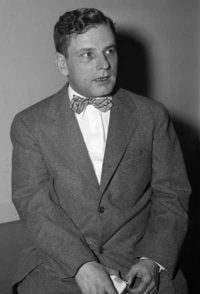 May 7: The Senate Investigations Subcommittee, chaired by Sen. Joseph McCarthy (R-WI) releases transcripts of five hours of testimony between the committee and McCarthy critic James A. Wechsler, editor of the liberal New York Post, that took place on April 14 and May 5. Wechsler provided a list of people that he cited as having been Communists or members of the Young Communist League when Wechler had been a member years ago. McCarthy calls Wechsler’s break with communism “phony.” Wechsler counters that “under the standards you have established here… the only way I could in your view prove my devotion to American and the validity of my break with Communism would be to come out in support of Senator McCarthy. This I do not plan to do.” McCarthy charges that the New York Post’s editorial policies follow the line of the official Communist Party paper The Daily Worker, and says that “your abuse of freedom of the press and your low ethical standards as a newspaper man” would be investigated. Weschler retorts, “The New York Post is as bitterly opposed to Joe Stalin as it is to Joseph McCarthy.” Weschler also calls the hearing “a reprisal against the Post for its fight against the chairman of this committee. I believe I would not be here if I were not the editor of the Post and I did not engage you in such a fight.” Referring to the presence of the New York Journal-America’s Howard Rushmore as the committee’s research director despite being a former Communist, and noting that all other journalists have been barred from the hearings, Wechsler concludes, “Senator, let’s face it. You are saying that an ex-Communist who is for McCarthy is a good one and an ex-Communist who is against McCarthy is suspect.”
May 7: The Senate Investigations Subcommittee, chaired by Sen. Joseph McCarthy (R-WI) releases transcripts of five hours of testimony between the committee and McCarthy critic James A. Wechsler, editor of the liberal New York Post, that took place on April 14 and May 5. Wechsler provided a list of people that he cited as having been Communists or members of the Young Communist League when Wechler had been a member years ago. McCarthy calls Wechsler’s break with communism “phony.” Wechsler counters that “under the standards you have established here… the only way I could in your view prove my devotion to American and the validity of my break with Communism would be to come out in support of Senator McCarthy. This I do not plan to do.” McCarthy charges that the New York Post’s editorial policies follow the line of the official Communist Party paper The Daily Worker, and says that “your abuse of freedom of the press and your low ethical standards as a newspaper man” would be investigated. Weschler retorts, “The New York Post is as bitterly opposed to Joe Stalin as it is to Joseph McCarthy.” Weschler also calls the hearing “a reprisal against the Post for its fight against the chairman of this committee. I believe I would not be here if I were not the editor of the Post and I did not engage you in such a fight.” Referring to the presence of the New York Journal-America’s Howard Rushmore as the committee’s research director despite being a former Communist, and noting that all other journalists have been barred from the hearings, Wechsler concludes, “Senator, let’s face it. You are saying that an ex-Communist who is for McCarthy is a good one and an ex-Communist who is against McCarthy is suspect.”
![]()
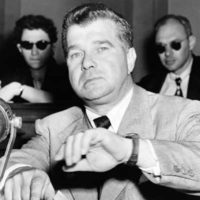 May 7: Robert Rossen, director, writer and producer of the 1949 Academy Award-winning film All the King’s Men, publicly renounces his 1951 refusal to tell the House Un-American Activities Committee everything he knew about the Communist party. He tells HUAC that he had been a party member from 1937 to 1947, contributing $40,000 (roughly $600,000 today) to the party during that time. Rossen names fifty-seven colleagues, many of them close friends. His testimony comes after having been blacklisted by Hollywood since his 1951. But unlike others on the blacklist who could to go to Europe to find work, the State Department had cancelled Rossen’s passport, leaving him stranded both physically and professionally. Despite Rossen’s turnabout performance, his career will never fully recover.
May 7: Robert Rossen, director, writer and producer of the 1949 Academy Award-winning film All the King’s Men, publicly renounces his 1951 refusal to tell the House Un-American Activities Committee everything he knew about the Communist party. He tells HUAC that he had been a party member from 1937 to 1947, contributing $40,000 (roughly $600,000 today) to the party during that time. Rossen names fifty-seven colleagues, many of them close friends. His testimony comes after having been blacklisted by Hollywood since his 1951. But unlike others on the blacklist who could to go to Europe to find work, the State Department had cancelled Rossen’s passport, leaving him stranded both physically and professionally. Despite Rossen’s turnabout performance, his career will never fully recover.
![]() May 7: Stage producer Lee Sabinson also appears before the House Un-American Activities Committee, which quizzes him on his support for what the Committee calls “Communist causes.” Sabinson denies being a Communist, but he is otherwise unrepentant: “Whenever I found a cause I thought was decent or worthwhile, representing a struggle for decency to push a problem, I lent my name.” When Sabinson is asked whether he would be willing to support any organization that has “peace” in its name, Sabinson answers, “For peace, yes.” Sabinson says there should be a committee investigating subversive activities, and adds: “If I am familiar with any subversive activities, I will cooperate. And may I say that on Eighty-sixth Street in New York City last Friday night there was a Bundist meeting at which Senator McCarthy was heiled, again Friday night there will be such a meeting.”
May 7: Stage producer Lee Sabinson also appears before the House Un-American Activities Committee, which quizzes him on his support for what the Committee calls “Communist causes.” Sabinson denies being a Communist, but he is otherwise unrepentant: “Whenever I found a cause I thought was decent or worthwhile, representing a struggle for decency to push a problem, I lent my name.” When Sabinson is asked whether he would be willing to support any organization that has “peace” in its name, Sabinson answers, “For peace, yes.” Sabinson says there should be a committee investigating subversive activities, and adds: “If I am familiar with any subversive activities, I will cooperate. And may I say that on Eighty-sixth Street in New York City last Friday night there was a Bundist meeting at which Senator McCarthy was heiled, again Friday night there will be such a meeting.”
![]()
 May 8: A nuclear bomb is dropped from a B-50 Superfortress over the Nevada Test Set. It detonates at 2,400 feet, and yields 27-kilotons. The purpose of the test is to observe the blast’s effect on trees, model houses, bunkers and simulated fortifications. About 3,500 soldiers take part in Desert Rock exercises. The shock wave hits Las Vegas but causes no damage. The concussion is heard as far away as St. George, Utah, and Bishop, California.
May 8: A nuclear bomb is dropped from a B-50 Superfortress over the Nevada Test Set. It detonates at 2,400 feet, and yields 27-kilotons. The purpose of the test is to observe the blast’s effect on trees, model houses, bunkers and simulated fortifications. About 3,500 soldiers take part in Desert Rock exercises. The shock wave hits Las Vegas but causes no damage. The concussion is heard as far away as St. George, Utah, and Bishop, California.
![]()
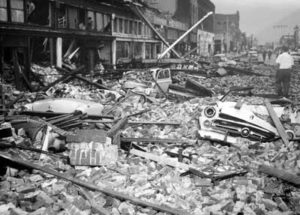 May 11: A deadly F5 tornado hits downtown Waco, Texas, killing 114. The tornado damages or destroys every building in a twenty-block area.
May 11: A deadly F5 tornado hits downtown Waco, Texas, killing 114. The tornado damages or destroys every building in a twenty-block area.
![]() May 16: The single “The Song from Moulin Rouge (Where Is Your Heart)”, by Percy Faith and His Orchestra, begins its ten week run at number one.
May 16: The single “The Song from Moulin Rouge (Where Is Your Heart)”, by Percy Faith and His Orchestra, begins its ten week run at number one.
![]()
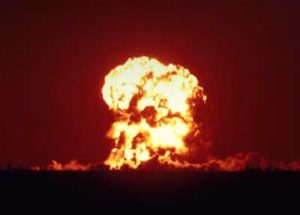 May 19: An new design for an atomic bomb is detonated at the Nevada Test Set just before dawn. The powerful 32-kiloton explosion is the most efficient yield so far. But the Harry shot of the Upshot-Knothole series of tests will wind up being the dirtiest on the continental U.S. “Dirty Harry,” as the shot will become known once the details are made public, had been delayed for three days due to unfavorable weather conditions. On the fourth day, conditions seemed perfect. But a sudden wind shift and change in wind speed causes a change in the anticipated fallout pattern. St. George, Utah, 135 miles away, gets the worst of it. Residents are told to stay indoors from 9:00 a.m. to noon, while some notice an “oddly metallic sort of taste in the air.” About fifty cars in North Las Vegas are contaminated, as are another forty in Cedar City. The Atomic Energy Commission says that the measured radiation is not strong enough to harm human beings. But residents in eastern Nevada and Utah are much more worried than before, and they are now more skeptical of the AEC’s reassurances. Rep. Douglas Stringfellow (R-UT) asks that testing at the Nevada site “be brought to a speedy conclusion.”
May 19: An new design for an atomic bomb is detonated at the Nevada Test Set just before dawn. The powerful 32-kiloton explosion is the most efficient yield so far. But the Harry shot of the Upshot-Knothole series of tests will wind up being the dirtiest on the continental U.S. “Dirty Harry,” as the shot will become known once the details are made public, had been delayed for three days due to unfavorable weather conditions. On the fourth day, conditions seemed perfect. But a sudden wind shift and change in wind speed causes a change in the anticipated fallout pattern. St. George, Utah, 135 miles away, gets the worst of it. Residents are told to stay indoors from 9:00 a.m. to noon, while some notice an “oddly metallic sort of taste in the air.” About fifty cars in North Las Vegas are contaminated, as are another forty in Cedar City. The Atomic Energy Commission says that the measured radiation is not strong enough to harm human beings. But residents in eastern Nevada and Utah are much more worried than before, and they are now more skeptical of the AEC’s reassurances. Rep. Douglas Stringfellow (R-UT) asks that testing at the Nevada site “be brought to a speedy conclusion.”
![]()
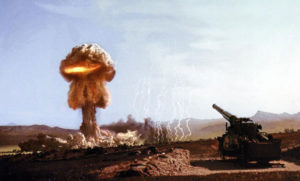 May 25: The Army fires the nation’s first atomic shell from a huge cannon at the Nevada Test Site. The nuclear projectile is shot at 8:30 a.m. from an 85-ton 280 mm cannon, nicknamed “Atomic Annie.” The shell is hurtled seven miles away, and is detonated by a time fuse at an altitude of 500 feet. The test is considered a success, and at least twenty such cannons will be manufactured and deployed overseas.
May 25: The Army fires the nation’s first atomic shell from a huge cannon at the Nevada Test Site. The nuclear projectile is shot at 8:30 a.m. from an 85-ton 280 mm cannon, nicknamed “Atomic Annie.” The shell is hurtled seven miles away, and is detonated by a time fuse at an altitude of 500 feet. The test is considered a success, and at least twenty such cannons will be manufactured and deployed overseas.
![]() May 26: Composer Aaron Copland is called before the Senate Permanent Subcommittee on Investigations, chaired by Sen. Joseph McCarthy (R-WI). In the closed hearing, Copland, who has long been active in progressive causes and whose work is revered for its celebrations of America (Fanfare for the Common Man, A Lincoln Portrait, Rodeo, Appalachian Spring) denies having been a Communist or being involved in Communist activities. McCarthy and subcommittee counsel Roy Cohn grill Copland over statements that he signed that also bore signatures of other alleged and known Communists. They also grill him about his support for organizations which, many years later, were alleged to be subversive by the House Un-American Activities Committee or the Attorney General. Copland acknowledges lending support to many of those organizations, but says that others sometimes used his name without authorization. Copland was among those named in the unofficial blacklist Red Channels, which has led the State Department to ban performances of his works at embassies and sponsored cultural events abroad. It also caused A Lincoln Portrait to be withdrawn from Eisenhower’s inaugural concert.
May 26: Composer Aaron Copland is called before the Senate Permanent Subcommittee on Investigations, chaired by Sen. Joseph McCarthy (R-WI). In the closed hearing, Copland, who has long been active in progressive causes and whose work is revered for its celebrations of America (Fanfare for the Common Man, A Lincoln Portrait, Rodeo, Appalachian Spring) denies having been a Communist or being involved in Communist activities. McCarthy and subcommittee counsel Roy Cohn grill Copland over statements that he signed that also bore signatures of other alleged and known Communists. They also grill him about his support for organizations which, many years later, were alleged to be subversive by the House Un-American Activities Committee or the Attorney General. Copland acknowledges lending support to many of those organizations, but says that others sometimes used his name without authorization. Copland was among those named in the unofficial blacklist Red Channels, which has led the State Department to ban performances of his works at embassies and sponsored cultural events abroad. It also caused A Lincoln Portrait to be withdrawn from Eisenhower’s inaugural concert.
![]() May 28: Chinese and North Korean troops launch a major attack against South Korean forces along the central part of the front line. Later in the night, the Communists shift their pressure to the western front north of Seoul against British and Turkish forces. After heavy fighting through the night, the U.N. troops regain most of the positions lost in the initial assault. Heavy back-and-forth fighting will continue over the next two days.
May 28: Chinese and North Korean troops launch a major attack against South Korean forces along the central part of the front line. Later in the night, the Communists shift their pressure to the western front north of Seoul against British and Turkish forces. After heavy fighting through the night, the U.N. troops regain most of the positions lost in the initial assault. Heavy back-and-forth fighting will continue over the next two days.
![]() May 29: Sir Edmund Hillary and Tenzing Norgay become the first to reach the summit of Mount Everest. News of the achievement will reach London on June 2, the day of Queen Elizabeth II’s coronation.
May 29: Sir Edmund Hillary and Tenzing Norgay become the first to reach the summit of Mount Everest. News of the achievement will reach London on June 2, the day of Queen Elizabeth II’s coronation.
![[Emphasis Mine]](http://jimburroway.com/wp-content/uploads/2018/01/RainbowWhiteHouse.jpg)
